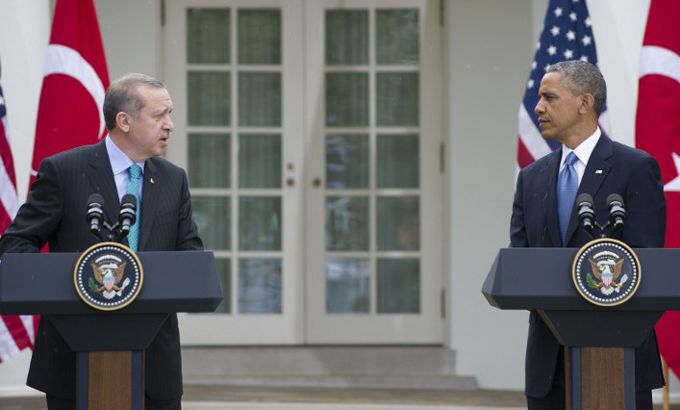Turkey PM and Obama discuss Syria
Two leaders pledge to increase pressure on Syria’s President Bashar al-Assad to step down during talks in Washington.

US President Barack Obama and Turkish Prime Minister Recep Tayyip Erdogan have pledged to increase pressure on Syria’s President Bashar al-Assad to step down.
Obama said in a news conference with Erdogan at the White House on Thursday that the only way to resolve Syria’s two-year crisis was for Assad to hand over power to a transitional government.
He said Turkey would play a critical role in that process.
“We’re going to keep increasing the pressure on the Assad regime and working with the Syrian opposition,” Obama said.
“We both agree that Assad needs to go.”
The leaders said that they had made Syria top of their agenda, as they agreed that the issue of chemical weapons was an important one and Obama said that the use of chemical arms should always be out of bounds.
Obama has warned that use of chemical weapons by the Syrian regime would be a “red line” that would require action by the international community.
Erdogan said that there was evidence of chemical weapons use in Syria but that it is important to get “more specific information” to confirm this before deciding how to respond.
Reviewing options
Obama said he was constantly reviewing options over Syria, as the US placed four Syrian ministers and Jabhat al-Nusra, leader of the al-Qaeda linked rebel group Muhammad al-Jawlani, to a terrorism blacklist. Syrian Arab Airlines and the privately held Al-Dunya Television were also added to the sanctions list for helping the regime.
“I preserve the option of taking additional steps, both diplomatic and military,” the president said.
Erdogan’s visit came as the UNHCR said that the number of people who have fled Syria since the start of the uprising in March, 2011, has reached 1,5 million. About 400,000 refugees are registered in Turkey.
Obama said the US would continue helping nations in the region deal with refugees.
Erdogan is visiting Washington days after two car bombs in Turkey killed dozens in the deadliest terrorist attack there in years.
Turkish authorities have blamed Syrian intelligence, and Erdogan has called for more aggressive steps to topple Assad’s government.
Obama extended condolences for what he called the “outrageous bombings” and said the United States stood with Turkey in fighting terrorism threats.
But the Obama administration remains reluctant to take the kind of action Turkey would like to see, including establishing a no-fly zone in Syria.
As much as Erdogan wants the US to exert greater power in Syria, the Obama administration sees Turkey as a critical broker on a host of issues in the region.
The administration recently negotiated a deal to repair ties between Turkey and Israel, which were severed following a 2010 Israeli raid on a Gaza-bound aid flotilla in which eight Turks and a Turkish-American were killed.
The administration hopes to see an understanding sealed during Erdogan’s visit on compensation for the victims of the raid and their families.
The US sees reconciliation between Turkey and Israel as critical as it seeks to revitalise peace talks between Israelis and Palestinians.
However, Erdogan said that he intended to visit Gaza in June, despite US pressure to delay the trip.
“I place a lot of significance on this visit in terms of peace in the Middle East,” Erdogan said.
Al Jazeera’s Patty Culhane, reporting from Washington, said: “Behind the scenes, the negotiating continues, while in Syria the official death toll rises to 80,000.”